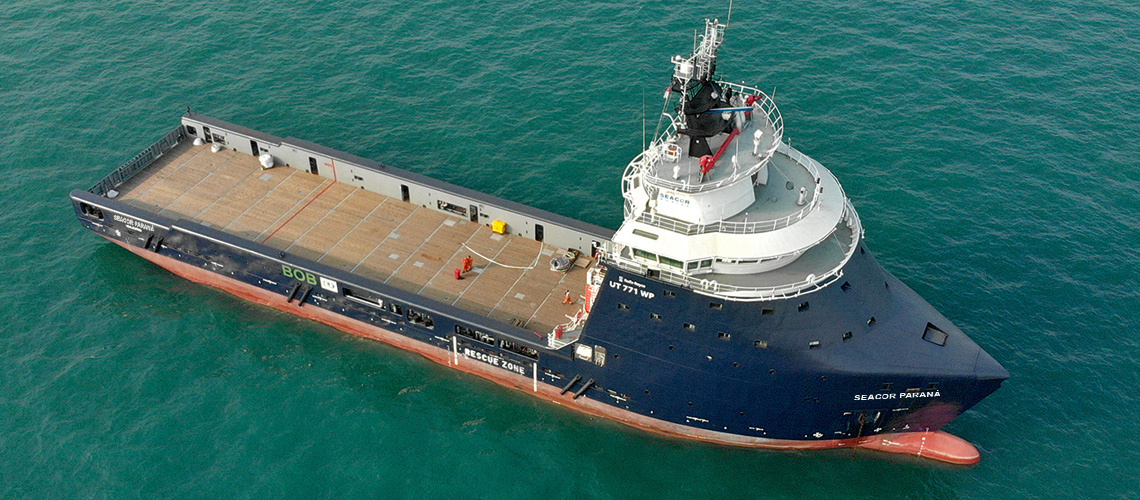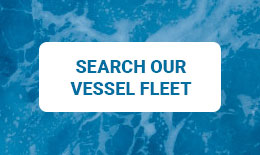Fast Support Vessels (FSV) have become an integral component of the logistics chain for offshore drilling and production operations due to their speed and versatility. These advanced vessels reach speeds over 38 knots and range in length from 145 to 200 feet and deliver over 13,500 BHP (brake horsepower).
Our FSVs advance the traditional offshore support vessel model and offer a more cost-efficient, comfortable, flexible, and safe option to helicopter transportation. Able to accommodate up to 150 passengers in true comfort, vessels in our FSV fleet feature reclining business-class seats, a range of entertainment packages such as satellite television and wireless internet, a well-equipped snack bar area and LED ambient lighting.
To provide customers with the ability to choose the right vessel for their specific needs, our FSVs offer industry-leading features such as DP1 & DP2, Dynamic Ride Control, Controllable Speed Propellers, Water Jet Propulsion and Engine Monitoring System. Cargo options from 140 long tons to 425 long tons include deck cargo, fuel, potable water, and drill water.
Our high-speed catamarans introduced a new era of larger and faster crew boats offering levels of technology, capability, and comfort. Capable of carrying up to 150 passengers at maximum speeds up to 40 knots. These vessels elevate comfort with reclining business class seats and a range of entertainment options that include satellite television and wireless internet service. Our catamarans are also available with a range of options to suite your particular needs, including DP2 and/or DP3, Dynamic Ride Control, Controllable Speed Propellers, Water Jet Propulsion, and Engine Monitoring System.
Vessels
CREWZER FSVs
 SEACOR Marine’s CREWZER class vessels launched in 2007, adding worldwide state-of-the-art passenger transportation vessels to the SEACOR Marine fleet. The CREWZER catamaran design provides for a very stable and comfortable ride at speeds of 40+ knots, more than twice that of traditional crew transport vessels or FSVs. CREWZER vessels are equipped with ride-control technology providing for a smooth ride at high speeds in aggressive sea states. With its high speed, cargo capabilities and 150-passenger capacity, the CREWZER class vessel is ideal for deepwater hotshot missions, platform evacuations and emergency situations.
SEACOR Marine’s CREWZER class vessels launched in 2007, adding worldwide state-of-the-art passenger transportation vessels to the SEACOR Marine fleet. The CREWZER catamaran design provides for a very stable and comfortable ride at speeds of 40+ knots, more than twice that of traditional crew transport vessels or FSVs. CREWZER vessels are equipped with ride-control technology providing for a smooth ride at high speeds in aggressive sea states. With its high speed, cargo capabilities and 150-passenger capacity, the CREWZER class vessel is ideal for deepwater hotshot missions, platform evacuations and emergency situations.
The CREWZER vessel design provides for approximately 30% more fuel-efficiency, resulting in lower per-seat-mile cost when compared to conventional crew transport vessels. Equipped with DP3 and cutting-edge navigation and communications technology, as well as satellite link remote diagnostic capabilities, the CREWZER vessels are designed to be one of the world’s safest crew transport vehicles.
CREWZER vessels are equipped with amenities previously unheard of in oilfield transportation, including first-class reclining seats, a snack bar, a conference room, wireless internet and large-screen televisions. The versatility, redundant systems and passenger amenities of the CREWZER vessels have set new standards for the maritime industry.
MCCALL® FSVs
SEACOR Marine’s McCall Vessels have been designed to bring over 13,000 BHP, reach speeds of over 38 knots, and are built to range in length from 130 to 206 feet. Customers can match the right McCall FSV to their specific requirements by choosing from an array of advanced features, such as Dynamic Positioning, Dynamic Ride Control, Water jet Propulsion, Full Vessel Monitoring (CSP), boarding ramps to accommodate any dock and environmentally friendly equipment. The MCCALL vessels can also carry deck cargos ranging from 140 to 425 long tons, cargo fuel, as well as potable and drill water. These vessels are designed to allow for up to 102 passengers who can enjoy reclining business class seats and various entertainment options such as satellite television and Wi-Fi internet service.
Norman McCall: Rich History of Marine Transportation
Born in 1924 on the banks of the Mermentau River in Grand Chenier, Louisiana, Norman McCall is an industry legend. He is widely recognized, both domestically and internationally, as a marine transportation pioneer and a groundbreaking innovator in vessel size, capacity, and performance.
As a young boy, Norman’s father owned a small shipping company in Louisiana where the only means of transportation were rough roads or by water. He grew up crewing on his father’s 55-foot utility vessel. Norman spent one year at Louisiana Tech University before enlisting in the United States Navy at the outbreak of WWII. Norman served on the submarine USS Jack, which was credited with sinking 30 Japanese ships. Returning from the war at the dawn of the offshore oil industry, Norman took a job with Pure Oil as a captain on a converted minesweeper doing seismic work in the Gulf of Mexico. By 1947, Norman had purchased his first crew/transport vessel and a small utility boat to provide service to the fledging industry.
In 1969, Norman built his first crew transport vessel, the first of many to come, and over the years he has pushed the envelope on vessel size, power and technology, adding increasingly complex communications and navigation equipment. In the process, the “McCall” name has become synonymous with large crew boats and his ideas have shaped an industry, so much that many of Norman’s innovations have become industry standards. As a businessman, he earned universal respect for his sense of honor and integrity.
SEACOR Marine’s purchase of Norman’s business in 1996 allowed SEACOR Marine to create a global service in offshore crew boats and to set in motion plans for new technology that would revolutionize the marine industry.
After more than 60 years in the business, the story of Norman McCall is unfinished and his work has continued on by his son, Joe McCall. Norman’s impact on marine transportation and the many lives he has touched along the way is powerful and everlasting, and the legend he has become, together with the legacy he has created, are assured. SEACOR Marine is proud of the addition of the MCCALL® vessels to its fleet and is honored to share this rich history in marine transportation.


